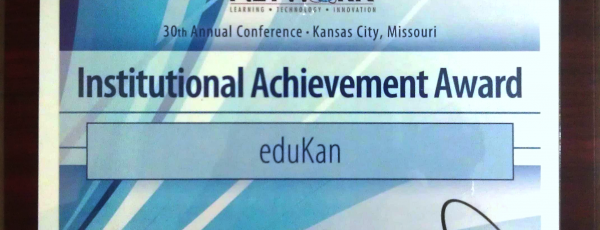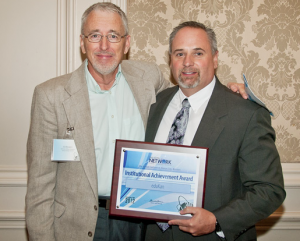Dr. Mark Sarver, CEO of eduKan and Jeff Maynard, CEO of Biometric Signature ID will be presenting their case study during a session in the Digital Learning Environments and Communities track at the Sloan-C 5th Annual International Symposium on Emerging Technologies for Online Learning.

eduKan – Innovating Education
Dr. Mark Sarver, CEO of eduKan, a consortium of colleges in Kansas, and Jeff Maynard, CEO of Biometric Signature ID, (BSI), are scheduled to co-present at the upcoming Sloan-C Symposium on Emerging Technologies for Online Learning. The presentation will highlight the dramatic cost savings and long-term benefits from eduKan’s use of BSI’s patented BioSig-ID™ biometric technology for student identity proofing. The case study report released earlier this year shows an 80% reduction in proctoring fees, among other benefits. BSI is the only company with a patented software-only biometric technology that exceeds NIST accuracy requirements in the $12.6B Identity and Access Management (IAM) authentication market.
Sarver and Maynard will be sharing the results of a pilot study conducted from May-December 2011 with eduKan students who were using BSI’s technology to authenticate their identity. eduKan’s CEO was seeking a solution that would reduce operational costs, increase student identity compliance, keep student fees low to help gain a competitive advantage, and ensure the highest levels of academic integrity for their growing enrollment.
“eduKan was concerned with costs, ease of use, privacy, accuracy and accountability,” said Jeff Maynard, CEO, Biometric Signature ID. “BSI was excited to work with Dr. Sarver and knew our innovative technology would allow him to accomplish his goals, track the success of the project with documented milestones and show quantifiable results.”
From the beginning of the pilot to the rollout for institution-wide usage, eduKan is now benefiting by:
- Lowering operational costs for physical proctoring by 80% including faculty / staff time and physical management expense (8,000 + hours on average / per year saved)
- Reducing and/eliminating proctoring costs for students – which can average $38 per proctored exam / $380 per year and helps reduce their overall cost of education
- Using a fixed fee structure for *unlimited* student ID authentications – under $15 per student per year which increases the number of validations now available to eduKan for the school term, not at final event time
- Ensuring student privacy by using the only biometric that can be revoked and reissued
- Offering easy to use technology with 94% positive user experience
- Decreasing student support needs while increasing ease of deployment for eduKan’s growing student enrollments as BSI can be used on any system, tablet, smart phone, Android, Mac or PC, Flash or HTML5 without installing any additional software or hardware
- Utilizing the most accurate biometric validation system on the market with 3rd party test results indicating 99.97% accuracy rate for keeping impostors out
“We believe in being proactive and using technology that helps us leverage our current staff while expanding our capabilities,” says Dr. Mark Sarver, CEO of eduKan. “The risk-reward in adopting new technologies comes down to ‘the plan,’ and we had a very methodical plan with clear goals and objectives that we were able to achieve and are excited to share at Sloan this year.”
Attendees of the Sloan-C 5th Annual International Symposium on Emerging Technologies for Online Learning can see this presentation on July 25, 2012 at 1:30 PM in Casanova 603 at the Venetian | Palazzo Resort in Las Vegas. Sarver and Maynard were also nominated for a Sloan Effective Practice Award and have published their submission here: http://sloanconsortium.org/effective_practices/student-identity-proofing-biometrics-meet-regulations-lower-operational-costs-re.
About eduKan
eduKan provides access to quality higher education, including ESL courses, via college degrees, certificates, and individual courses, with affordable online classes. eduKan was founded in 1998 as a cooperative effort between member colleges to offer courses via the Internet. eduKan’s consortium schools are all accredited Kansas learning institutions with excellent reputations and long histories of providing degrees in traditional settings, as well as through online courses. eduKan Consortium member institutions are: : Barton Community College, in Great Bend; Colby Community College, in Colby; Dodge City Community College, in Dodge City; Garden City Community College, in Garden City; Pratt Community College, in Pratt; and Seward County Community College/Area Technical School, in Liberal. For more information, please visit http://www.edukan.org.
About Biometric Signature ID
A Dallas-based software company, Biometric Signature ID, Inc. (BSI), provides solutions to reduce identity fraud through its’ patented BioSig-ID Online™ biometric handwriting and gesture technologies. BSI has been recognized by Frost & Sullivan for developing the Product Innovation of the Year in 2010, have been vetted by the State of Texas Emerging Technology Fund advisory committee and granted a commercialization award for their break-through technology. BSI has also received a 99.97% rating of accuracy (false positive rate) proof-of-performance validation from the Tolly Group’s independent testing lab, which exceeds NIST recommendations by a factor of three. Their identity proofing products have worldwide applications including student ID authentication, secure online banking, mobile banking, or to create a secure password authentication before allowing access to any online portal or site like healthcare or gaming, for Internet-based transactions. To learn more about how BSI solutions can help with your Identity proofing needs visit our website at http://www.biosig-id.com or call us at (800) 871-2817.









